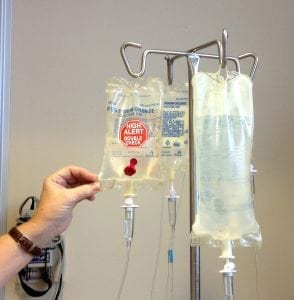A Phase 2 clinical study set out to determine whether prexigebersen, alongside decitabine and venetoclax, would be effective in treating and stopping the progression of a rare cancer of the blood and bone marrow called acute myeloid leukemia (AML). In AML, the bone marrow produces abnormal platelets, red blood cells, and white blood cells called myeloblasts. As these crowd healthy blood cells out of the bone marrow, it creates a number of health issues and leads to symptoms like fever, bone pain, lethargy, pale skin, easy and unusual bruising and bleeding, shortness of breath, and frequent infections.
Right now, AML may be treated with remission induction therapy, chemotherapy, Trisenox and ATRA, and stem cell transplants. But continued research is necessary: first because some individuals do not respond well to treatment, and second to identify therapies that could fill unmet needs or increase how effective treatment is.
According to a news release from biotechnology company Bio-Path Holdings, Inc. (“Bio-Path”), the company found that prexigebersen could bring benefits to the treatment landscape. Prexigebersen, which has received Orphan Drug designation in both the United States and European Union, is described as:
a neutral-charge, liposome-incorporated antisense drug designed to inhibit protein synthesis of Grb2 (growth factor receptor bound protein 2), [which] plays an essential role in cancer progression via the RAS activation pathway. Inhibition of Grb2 by prexigebersen represents a significant advance in treating cancers with activated tyrosine kinases using a target not druggable with small molecule inhibitors.
A Phase 2 Study: Evaluating Prexigebersen for AML
The interim data analysis comes from Stage 2 of the Phase 2 clinical trial. Participants were split into three separate cohorts. The first consisted of people whose cancer was newly diagnosed; they received a combination of prexigebersen, decitabine, and venetoclax. In the second cohort, which consisted of people whose condition was relapsed or refractory, treatment involved prexigebersen, decitabine, and venetoclax. Finally, the third cohort consisted of individuals with relapsed or refractory AML who could not use venetoclax. As a result, their treatment only included prexigebersen and decitabine. Through this, the researchers hoped to identify whether adding prexigebersen to these treatments contributed to better patient responses. The efficacy results being reported on today focus on Cohorts 1 and 2.
Analyzing study results found prexigebersen to be safe and well-tolerated. Although side effects did occur, the researchers report that these side effects are similar to what is seen from other AML treatments. In terms of efficacy, 86% of people in Cohort 1 and 57% of people in Cohort 2 achieved complete remission, which means that there were no clinical signs of cancer. 14% and 22% respectively also had a partial response, making the total response 100% and 93% in the two groups. Given that only 62% of newly diagnosed patients and 21% of those with relapsed/refractory AML typically achieve complete remission on decitabine and venetoclax, the responses seen within this study were significantly higher.






